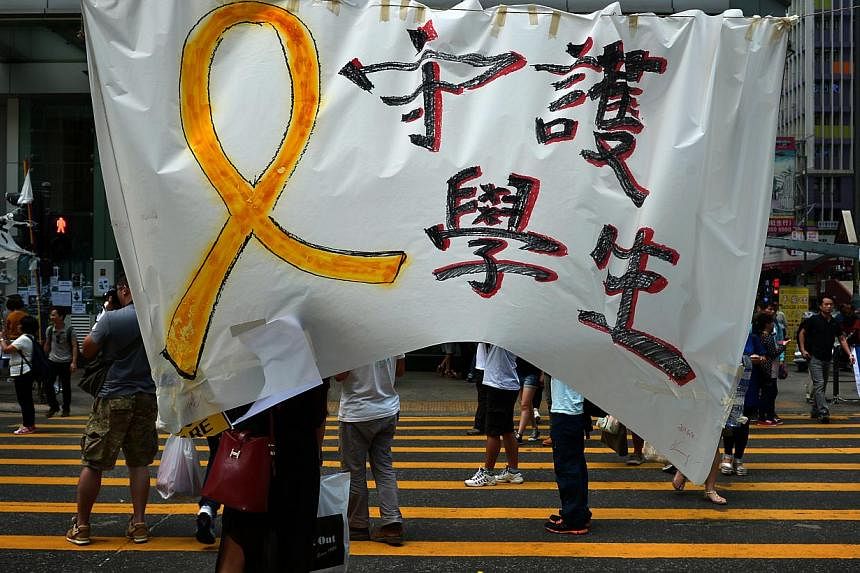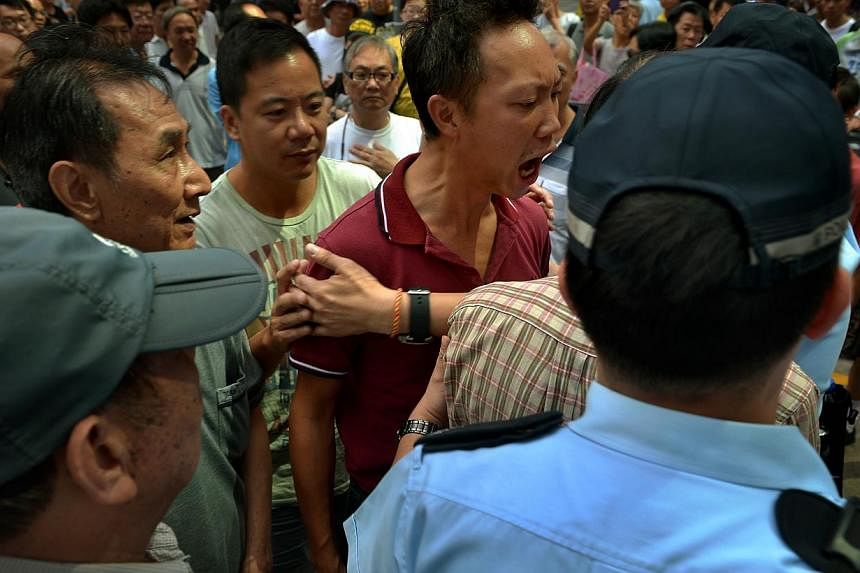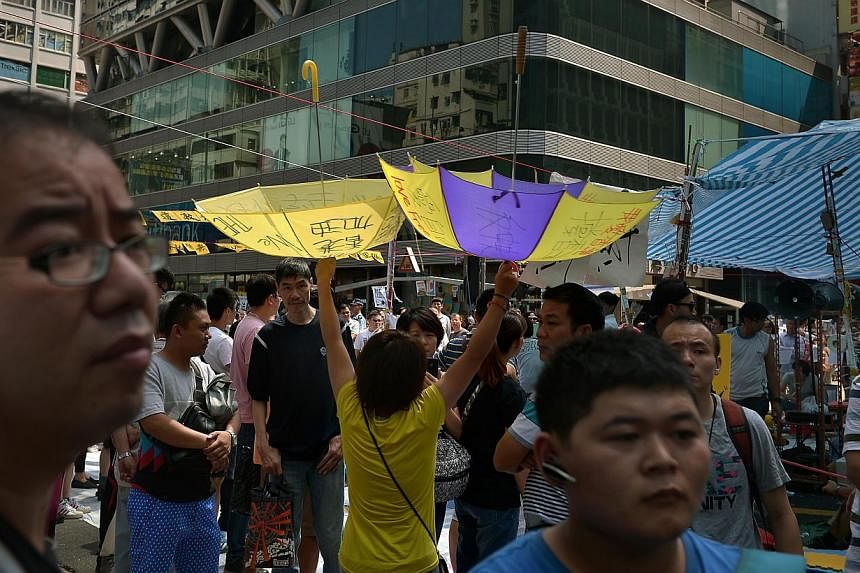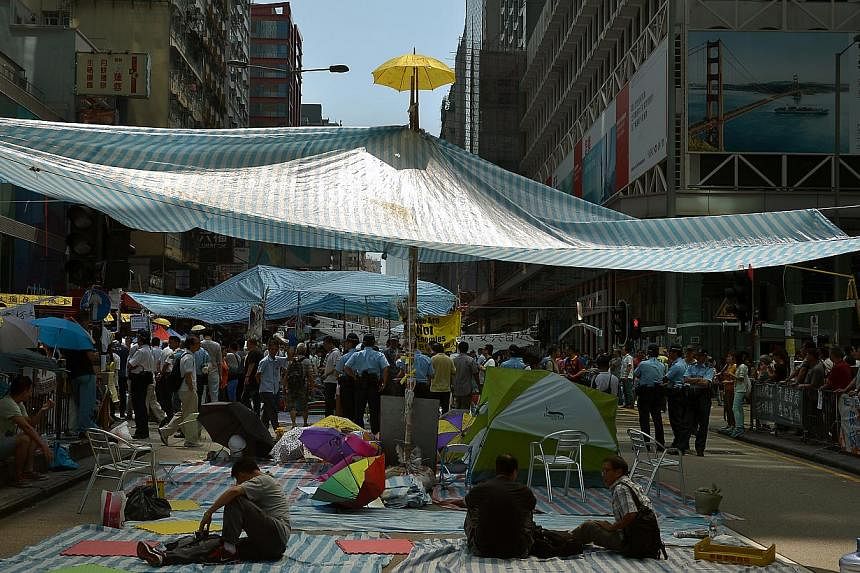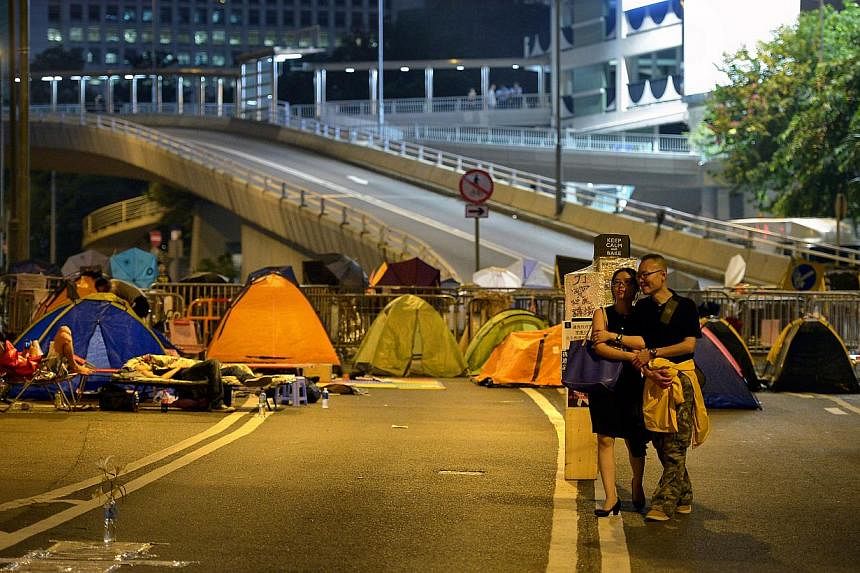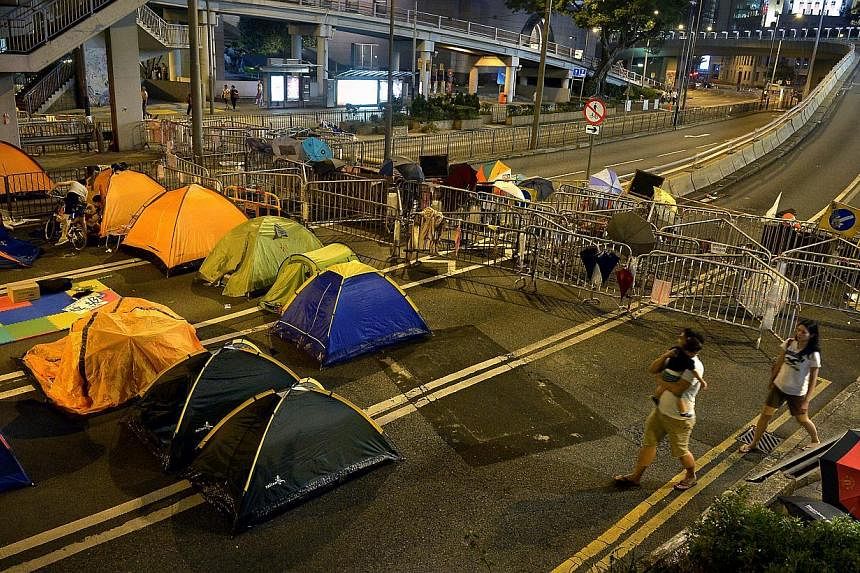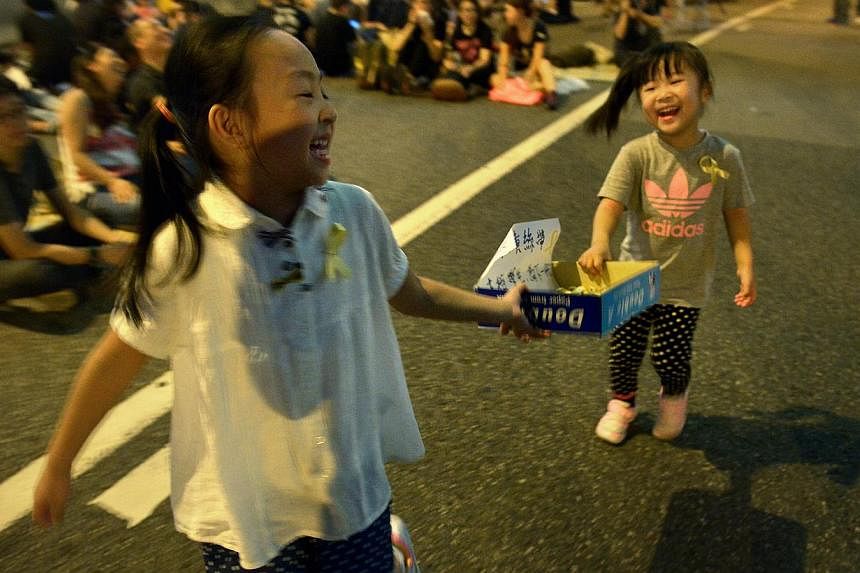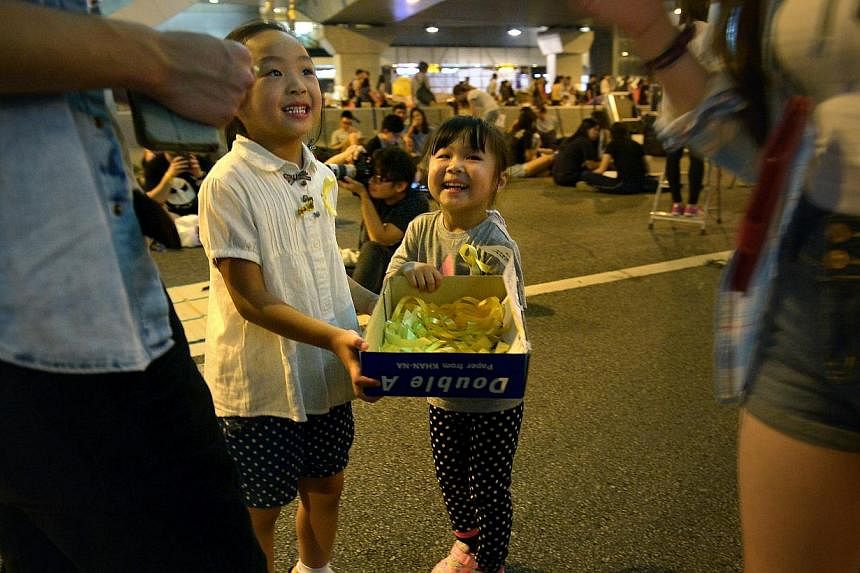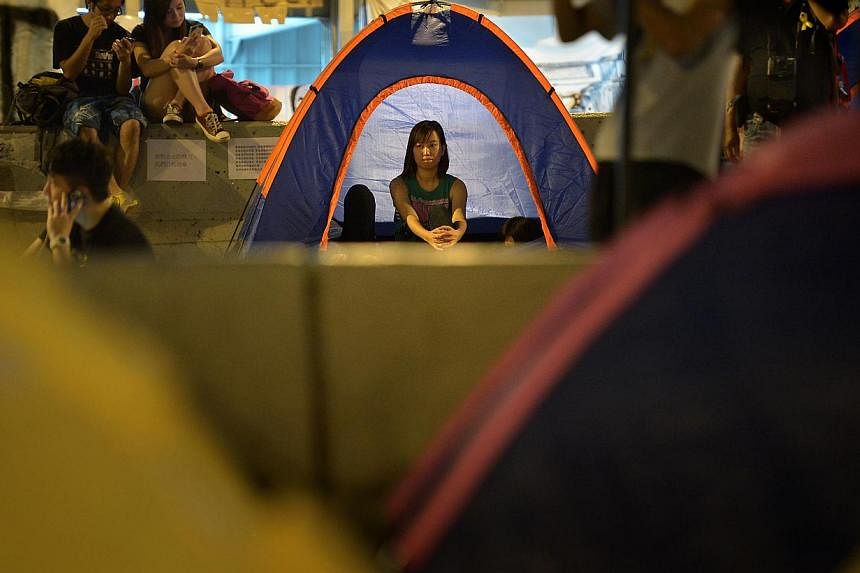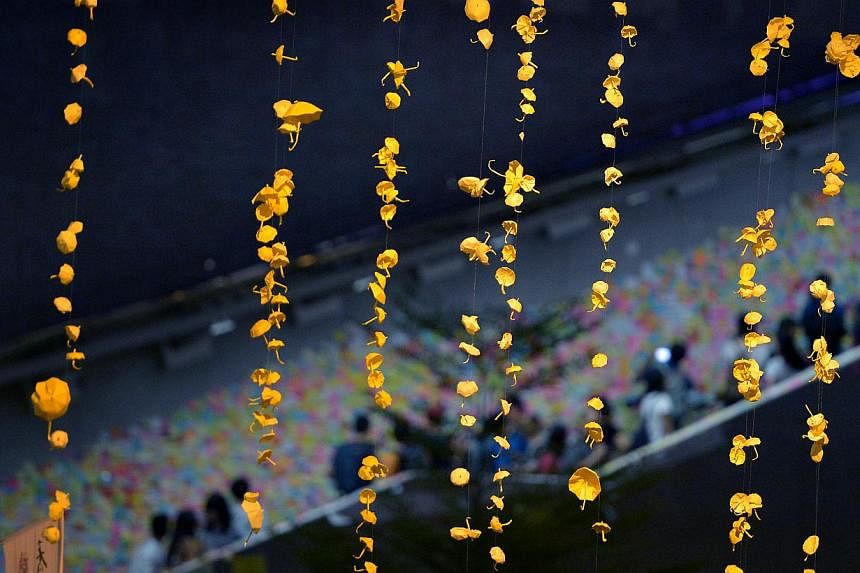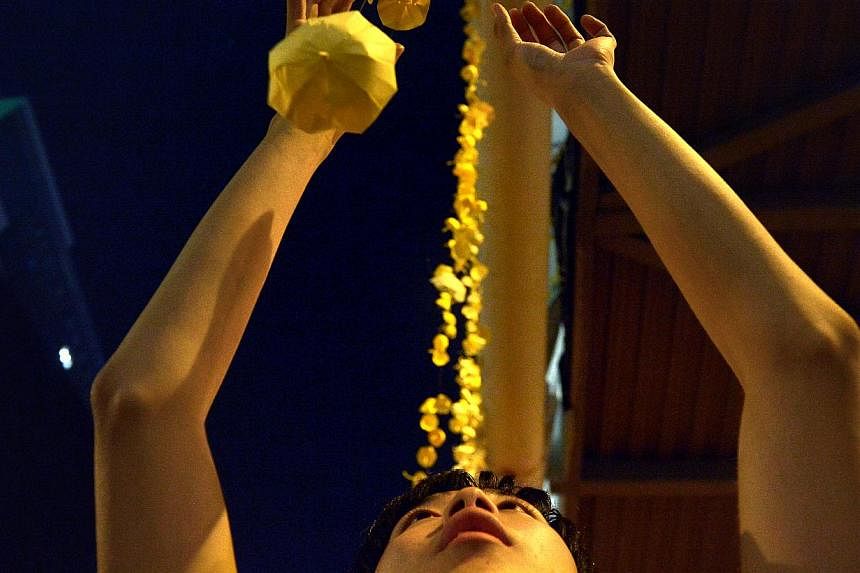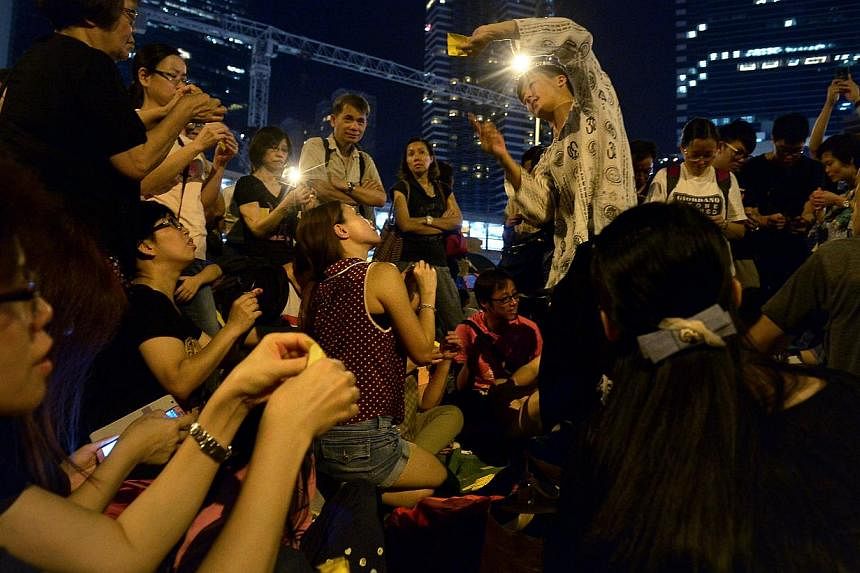AS THE Occupy Central movement enters its third week with no end to the impasse in sight, Hong Kong leader Leung Chun Ying has again ruled out resigning, saying that this "will not solve the problem".
He also indicated that a return to the table for talks with the protest organisers is not under consideration, given that they want Beijing to rescind its strict rules on Hong Kong's chief executive election, and to introduce public nomination - the right for the people to choose the candidates who can run in the race.
Acceding to these demands, he said, is "impossible".
The embattled Chief Executive was speaking in an interview broadcast on Sunday morning on local station TVB, the first lengthy interview he's done since the crisis erupted on Sept 28.
Asked if the government will take the action of clearing out the protest sites in Admiralty, Mong Kok and Causeway Bay by force, he said that it will continue to persuade the protesters to leave voluntarily. If action is required, the police will use minimal force without hurting the students and other young protesters, he said.
Further indicating that the government will likely continue to take a hands-off approach, he added that he is confident that the protests "cannot go on for a long time", pointing to its organic nature and the lack of leadership within the movement.
Mr Leung described the crisis as a "mass movement that has spiralled out of control", but stressed that it is "not a revolution". He admitted that there is "a degree of difficulty in dealing with it".
"While the government has a responsibility to enforce the law, the circumstances are unique and because we care for and love our students, we had been most tolerant in dealing with the situation," he argues.
Mr Leung's comments are likely to be contested by critics who point to the police's early actions including the use of tear gas on Sept 28, to disperse mostly peaceful protesters.
On that fateful decision that almost single-handed propelled more outraged Hong Kongers onto the streets, Mr Leung said that it was one taken by the police commander on the ground.
Asked if he had a role in stopping the use of tear gas after the public backlash, he said: "We should not interfere in the decision-making process of the police - this is not a political decision but one taken by the police."
Mr Leung said that the government had to take account of the students' demands but said both their demands and actions had to be lawful. "We have and will continue to convince and communicate with students and we will try not to force to clear the area," he told TVB. "If we need to clear the area, I believe that police will use their professional training...using minimal force. We don't want to see our people and our students get hurt."
Mr Leung's interview also touched on accusations of financial impropriety and transparency issues, after revelations last week that he had accepted HK$50 million (S$8.23 million) in fees from Australian company UGL while in office the past two years.
The payment was part of a contract both sides had signed in return for Mr Leung - a former director of property services firm DTZ which UGL acquired - promising not to join or set up a rival firm. Mr Leung was also committed to acting as a "referee and adviser" to UGL "from time to time."
Mr Leung responded by saying he did not feel he had done anything morally or legally wrong.
He also said that he had not rendered any services to UGL since becoming chief executive on July 1, 2012.
The official People's Daily in Beijing described the so-called Occupy Central movement as "unrest" in a front-page editorial published on Saturday - language some analysts said reflected the growing unease among China's leaders.
Mr Leung's comments came as the protest centre outside government head offices in Admiralty took on the feel of a festival campsite in a canyon of skyscrapers. "In here, it is like a piece of green land," said Ms Maggie Cheung, a 27-year-old kindergarten teacher, who added that she would leave to start work tomorrow. "People are caring and we are sharing the same goal - we fight for a better future. It is like utopia here."
Hundreds of student activists camped overnight at major protest sites in Hong Kong as the democracy movement sought to regather momentum after the government called off talks on defusing unrest in the global financial hub.
Some 200 tents now line Gloucester and Harcourt roads on what had been one of Hong Kong's busiest thoroughfares leading to the glittering Central financial district.
Young and old, slept overnight in what some protesters described as the most peaceful, relaxed night yet. Some strummed guitars between speeches, others played cards or read.
Some studied in a makeshift classroom, complete with desks and power sockets set up on the highway.
Walls and overpasses have been festooned with thousands of notes, signs and banners, some depicting Leung as a mafia chief and others warning "Taiwan beware" of accepting a one country/two systems formula in any reunification deal with Beijing.
By Saturday evening, thousands of protesters had returned to join the stalwarts, including parents and children in a more relaxed, festival-like atmosphere. Scores more brought tents, foam and ground sheets to form a kind of sprawling urban campground hemmed in by towering skyscrapers. "Hong Kong is my home, we are fighting for Hong Kong's future, our future," said Mr Lawrence Chan, a 23-year-old media studies student, who has taken part in the protests from the outset.
Over 100 colourful tents were sprinkled across the eight-lane Harcourt Road highway, among scores of red and blue portable marquees serving as supply and first aid stations; stocked with water, biscuits, noodles and cereals. "We have tents here to show our determination that we're prepared for a long-term occupation," said Mr Benny Tai, one of the leaders of the movement, who emerged bleary-eyed from a tent pitched outside the Hong Kong government's headquarters.
The atmosphere was perhaps at its most relaxed since the Occupation movement began. Students, families and snap-happy tourists strolled along Harcourt Road, folding yellow paper origami umbrellas and penning colourful democracy missives.
Those notes have filled an entire covered walkway outside government headquarters christened the "Lennon" wall as a tribute to John Lennon.
Other studied and typed in an open-air classroom at makeshift desks with power sockets set up on the highway, while others gathered to hear and join stump speeches on democracy.
Hong Kong Chief Secretary Carrie Lam, who announced the postponement of talks with the students on Thursday because of their persistent calls to escalate action, said on Saturday that she had not given up hope of getting them on track again. "It's most important that we must make clear the aim and nature of the meeting," she told reporters during a weekend trip to China, stressing that the dialogue should centre on Beijing's proposed framework for electoral reform in 2017.
The leader of Hong Kong's largest pro-Beijing political party Tam Yiu Chung, conceded after a late meeting with Mr Leung that while the protests should be cleared as soon as possible: "It is not a simple thing and it is not a ripe time now."
In the first direct public comments by a senior Chinese leader in response to the protests, Premier Li Keqiang said the Hong Kong authorities had the ability to protect the city's economic prosperity and social stability. "Maintaining the long-term prosperity and stability of Hong Kong is not only in China's interests but is mostly in the interests of the people of Hong Kong," Mr Li said in Germany on Friday.
Scores of people ran a marathon in support of the students early on Saturday, and bridges remained festooned with umbrellas, protest art demanding full democracy and satirical images lampooning Mr Leung.
Protests escalated late last month, after Beijing's decision on Aug 31 to impose conditions that effectively would have stopped pro-democracy candidates from contesting an election of the city's chief executive set for 2017.
Since taking to the streets around two weeks ago, the activists have blocked major roads around the government precinct in Admiralty, as well as the shopping districts of Central and Causeway Bay.
At Friday's rallies, protest leaders urged demonstrators to prepare for a protracted struggle instead of expanding the protests geographically. The protests have led to some resentment among the public because of traffic jams and loss of business. A few street fights have broken out that pitted the students against anti-occupy mobs and local gangsters or triads.
It was unclear how long the Hong Kong authorities will tolerate the occupation or how the stand-off might be resolved. For now, however, police presence remains thin, with the authorities seemingly reluctant to risk fresh flare-ups.
Riot police had cracked down on protesters massing near the government headquarters on Sept 28, but the authorities have taken a softer line since. The police on Saturday again warned the protesters to leave.
The Occupy Central protests, referring to the Central business district, was an idea conceived over a year ago. It has presented Beijing with one of its biggest political challenges since it crushed pro-democracy demonstrations in and around Tiananmen Square in the Chinese capital in 1989.
Since Britain handed back control in 1997, China has ruled Hong Kong through a "one country, two systems" formula which allows wide-ranging autonomy and freedoms not enjoyed on the mainland and specifies universal suffrage as an eventual goal.
The Communist Party leadership has dismissed the Hong Kong protests as illegal and has left Leung to find a solution.
The Hong Kong Federation of Students urged President Xi Jinping in an open letter to allow full democracy in Hong Kong in what would be a "pioneering achievement" for him. Beijing fears that calls for democracy in Hong Kong could spread to the mainland, with China already facing separatist unrest in Tibet and Xinjiang.
With input from Reuters
